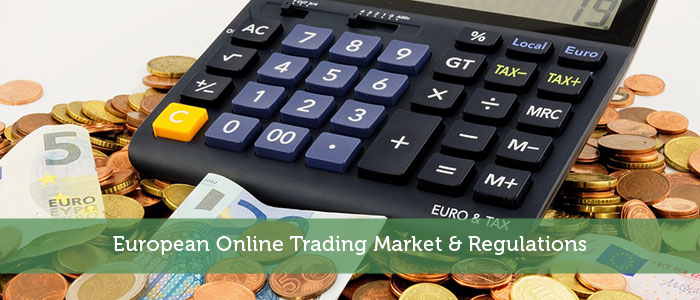The foreign exchange market, also called Forex is a market for trading currencies. It includes all aspects of exchanging, buying and selling currencies at current or determined prices. With regards to trading volume, it is the largest market in the world with the main participants being larger international banks. Trades between dealers can be extremely large involving hundreds of millions of Euros. Trading most commonly occurs online and in Europe, the most popular exchanges are in Frankfurt and London.
The European Forex Trading Markets
Within the European Union, there are some very well-run and operated Forex brokers. Most have plenty of banking methods available and trades can even be completed using mobile platforms allowing you to place your trade quickly and easily. In addition, web-based trading platforms are available. Rolling financial news feeds on broker web pages allows customers to stay up to date with current financial news. Trader bonuses and promotional offers are regularly available with brokers, offering customers maximum trading value.
Forex Regulatory Bodies
The European Forex trading market is decentralized, operating with no central exchange. Due to this and its global nature, the foreign exchange market is more prone to foreign exchange fraud and is much less regulated than other financial markets.
Some Forex brokers are regulated in certain countries, and in the UK the Financial Conduct Authority is an organization that acts as a watchdog and provides financial licenses to organizations that must comply with local regulations.
Regulation is in place to ensure a fair and ethical business model. Brokers, banks, and single sellers must comply with regulations set down by Forex regulators.
Forex Regulations
Forex regulations vary significantly from country to country and each broker must comply with the regulations in his jurisdiction. Typically, Forex brokers must be registered and licensed in the country where their deals take place. They may be subject to evaluations, recurrent reviews, and audits to ensure they are meeting industry standards. In addition, brokers must ensure they keep a sufficient amount of funds to be able to execute contracts for their clients and to return clients’ funds in the case of bankruptcy.
European Forex Regulations
In the European Union, the Markets in Financial Instruments Directive 2004 (MiFID) regulation allows a license from one member state to cover the entire continent of 31 member states. However, this can result in regulatory arbitrage where companies choose the European country with the least regulation, such as CySec in Cyprus. Members within the European Union can obtain a MiFID passport once registered. This allows them to trade within the European Union and gives them a higher level of protection compared to trading without the directive.
In the UK, the Financial Conduct Authority (FCA) is a financial regulatory body that operates independently of the government. It is financed through charging fees to members and works to maintain the integrity of the UK’s financial markets.
The Forex market is the world’s largest financial market yet continues to remain a largely unregulated business. Whilst regulations are gradually coming in both worldwide and within Europe, unregulated brokers have given the Forex market a bad reputation. Regulatory bodies are intended to prevent fraud, with MiFID in Europe instituted primarily to integrate European markets whilst ensuring transparency amongst its members. Its membership fees contribute towards its upkeep and pay for the auditing and assessment of brokers to ensure they are meeting local regulations.
Whilst Forex markets were largely unregulated in their earlier years, its rapid growth has led to increasing scrutiny and regulation. This protects customers and brokers, as well as countries from financial fraud.





